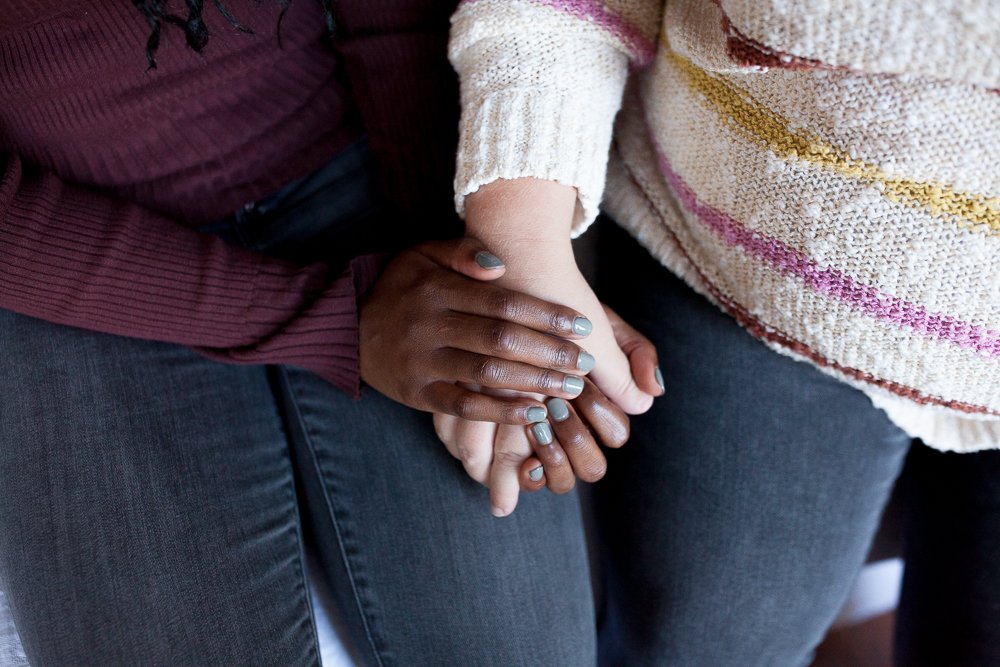Holy Interruptions: A Call to Love
Can you be still?”
Undoubtedly, I’ve uttered these words to my four-year-old daughter while wrangling her hair into a ponytail. But this time, she spoke them to me. Her request stopped my morning routine of unloading the dishwasher and cleaning up breakfast crumbs, and I met her eyes as she finished telling me a story. The interaction lingered with me long after she dismounted from her chair. (Maybe because my husband, too, once asked me to put down the dish rag while we talked?) I considered how God’s good command to love one another is embodied in a million ordinary moments easily overlooked for the sake of clean counters.
In this season of mothering young kids, my home is the primary arena for the practice of love. But regardless of vocation, marital status, or how we spend our days, every follower of Jesus is invited into a way of life that seeks others’ well-being above his or her own preferences—not in a self-abasing way, or one without any boundaries, but certainly in a way that carries “the death of Jesus in our body, so that the life of Jesus may also be displayed in our body” (2 Cor. 4:10 CSB).
The practical implications of this are infinite and unfolding as we grow in the knowledge of Christ’s love for us throughout our lifetimes. Through the grace and strength he alone provides, we can continue to choose to love like he loves. This reminder has helped guide and anchor my service both when the joy of self-sacrificial love is evident, and when it’s not: be interruptible in the present while keeping the end in view.
“The Lord does not turn away from his people’s sin and suffering with irritation or disgust. Rather, he draws near the most aching, unattractive parts of us.”
Be interruptible in the present…
It is remarkably challenging to attend to others’ needs, whether that’s a listening ear or something as tangible as a snack, when they collide with the litany of “to-do” and “to-think-about” items firing in my brain before the first cup of coffee. Without even knowing, I can pridefully assume that I determine the course of my day; Jesus, however, did nothing on his own accord, but only what the Father demonstrated (John 5:19).
Elisabeth Elliott quotes Janet Erskine Stuart:
“To be busy is to be engaged in an occupation which makes it inconvenient to be disturbed.” Elliott comments, “[Jesus] was at the disposal of His Father at all times and therefore at the disposal of all whom the Father sent to Him. There was never a sign of moodiness, selfishness, offense, boredom, or busyness. He never made a fuss about anything. This spirit of peace can be in us who are in Him. We can learn to see every minute of our day as His, not ours; every task to which we turn our attention as belonging to Him, not to us, everything that interrupts ‘our’ work as His work which must take precedence.”
Sometimes these interruptions and divine appointments feel costly. During a particularly difficult stint of parenting, I read Gentle and Lowly by Dane Ortlund. He describes how the Lord does not turn away from his people’s sin and suffering with irritation or disgust. Rather, he draws near the most aching, unattractive parts of us. We see it in Scripture: Jesus moves toward broken people and meets their deepest needs with truth and grace (oftentimes while on the road to somewhere or someone else!).
As we revel in the compassionate love of Christ, we will increasingly reflect him—remembering our own reliance on God’s grace, bearing with others in their pain and weakness, and persisting in love when it’s not easy or convenient.
As we lean on the Spirit for help to do this, we might ask ourselves, “How can I orient and structure my life in ways that are interruptible and available to the needs of others?”
“We cannot love perfectly. But every holy interruption in this present moment has the potential to point to the perfection of Jesus, both now and for eternity. ”
…While keeping the end in view.
As the house sleeps each night, a familiar refrain in my heart asks the Lord, but can I do it again tomorrow? Will you give me everything I need to love another day?
When energy and hope need renewed on a daily basis (or even more frequently), it’s encouraging to remember the aim of all this loving.
Zechariah’s song of praise at the birth of his son (who we know as John the Baptist) resonates with anticipation: “Because of our God’s merciful compassion, the dawn from on high will visit us to shine on those who live in darkness and the shadow of death, to guide our feet into the way of peace” (v. 78–79 CSB). Zechariah’s prophecy spoke of our Savior initiating a permanent Kingdom here on earth, and he used the imagery of a dawn to describe the hope we have coming to us: Christ came, and he will come again to reconcile all things to himself (Col. 1:20).
Perhaps wading through the literal darkest days of the year made this image even more meaningful to me, but it infused a sense of purpose into my mothering that can sometimes dim with fatigue and minutiae. A dawn—this new Kingdom unfurling slowly, slowly, and we get the first glimpse of its light. Furthermore, we get to contribute to it.
“What you do in the Lord is not in vain. . . Every act of love, gratitude, and kindness; every work of art or music inspired by the love of God and delight in the beauty of his creation; every minute spent teaching a severely handicapped child to read or to walk; every act of care and nurture, of comfort and support, for one’s fellow human beings and for that matter one’s fellow nonhuman creatures; and of course every prayer, all Spirit-led teaching, every deed that spreads the gospel, builds up the church, embraces and embodies holiness rather than corruption, and makes the name of Jesus honored in the world–all of this will find its way, through the resurrecting power of God, into the new creation that God will one day make.” (N.T. Wright, Surprised by Hope)
Paul writes in Ephesians 2 that God, being rich in mercy and love, saved us and seated us with him so that the world would see his immeasurable kindness (v. 4–8). We cannot love perfectly. But every holy interruption in this present moment has the potential to point to the perfection of Jesus, both now and for eternity.
“Having loved his own who were in the world, he loved them to the end.” (John 13:1) May we look to Christ as our example, and may we love one another with the same resolve.
MORE FROM JOURNEYWOMEN
IMPORTANT NOTE
Journeywomen articles are intended to serve as a springboard for continued study in the context of your local church. While we carefully select writers each week, articles shared on the Journeywomen website do not imply Journeywomen's endorsement of all writings and positions of the authors or any other resources mentioned.



